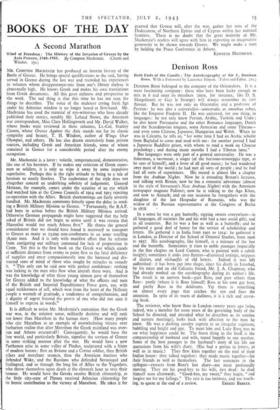Both Ends of the Candle : The Autobiography of Sir
E. Denison Ross. With a Foreword by Laurence Binyon. (Faber and Faber. 215.)
Denison Ross
DENISON Ross belonged to the company of the Orientalists. It is a most fascinating company: those who have been lucky enough to mix in it and meet its members (men, for instance, like D. S. Margoliouth or Guy le Strange) will always remember its rare flavour. But he was not only an Orientalist and a professor of Persian: he was also a universalist—universalis in omnibus rebus, like the Emperor Frederic II. He was universal, for one thing, in languages: he not only knew Persian, Arabic, Turkish and Urdu ; he also knew Portuguese and the other Romance languages, Dutch and the Scandinavian tongues, some Armenian and some Tibetan— and even some Chinese, Japanese, 'Hungarian and Welsh. When he was in Calcutta, he tells us, " for some time I had an Arabic scholar from Baghdad to come and read with me: for another period I had a Japanese Buddhist priest, with whom to read a work on Chinese psychology ; and during many months I had a Tibetan lama."
But languages were only part of a general universality. He was a fisherman, a raconteur, a singer (of the baritono-tenoreggio type, as he says of himself), and a lover of all good music; he had wandered over most of the world ; he had met all sorts of people ; and he had had all sorts of experiences. His record is almost like a chapter from the Arabian Nights. Now he is attending Renan's lectures, and talking with Renan; now he has a romantic adventure (almost in the style of. Stevenson's New Arabian Nights) with the American newspaper magnate Pulitzer; now he is talking to the Aga Khan, and now to Ataturk; and on one occasion he foregathers with the daughter of the last Hospodar of Rumania, who was the widow of the Russian representative at the Congress of Berlin in
1878. • In a sense he was a gay butterfly, sipping sweets everywhere—in all languages, all societies (he and his wife had a rare social gift), and in all countries. But he was a bee as well as a butterfly; and he gathered a good deal of honey for the service of scholarship and letters. He gathered it in India from 1901 to 1914: he gathered it in London, as Director of the School of Oriental Studies, from 1916 to 1937. His autobiography, like himself, is a mixture of the bee and the butterfly. Sometimes it rises to noble passages (especially in the fine chapter on Lord Curzon, who is painted with a subtle insight); sometimes it sinks into flutters—disjointed jottings, snippets
of diaries, and rechauff es of old letters. Indeed it was left unfinished: it has been put into shape, since his death in Istanbul, by his niece and an old Calcutta friend, Mr. J. A. Chapman, who had already worked on the autobiography during its author's life. The result is an uneven book—part Ross, and part others than Ross : partly (where it is Ross himself) Ross at his own gay best, and partly Ross in the doldrums. Yet there is something on almost every page that catches the eye and fixes the attention. In spite of its tracts of dullness, it is a rich and arrest- ing book.
The reviewer, who knew Ross in London twenty years ago (who, indeed, was a member for some years of the governing body of the School he directed, and attended what he describes as its sombre and austere meetings), looks back with affection to the man he knew. He was a dashing cavalry captain in an irregular regiment, bubbling and bright and gay. To meet him and Lady Ross was to see what happiness could be. The finest thing in the booR is the companionship of husband and wife, tuned happily to one another. Some of the best passages in the husband's story of his life are quotations from his wife's diary. (She had a genius in letters, as well as in music.) They flew kites together on the roof of their Indian house: they talked together : they made music together—for
their friends as well as themselves. The last sentences in the epilogue—extracts from Ross's last diary—are most profoundly moving. They are his good-bye to his wife, just dead: he died himself soon afterwards. " Good-bye, my sweet," they begin, " and forgive me for my failings." The rest is too intimate, and too touch-
ing, to quote at the end of a review. ERNEST BARKER.


























 Previous page
Previous page